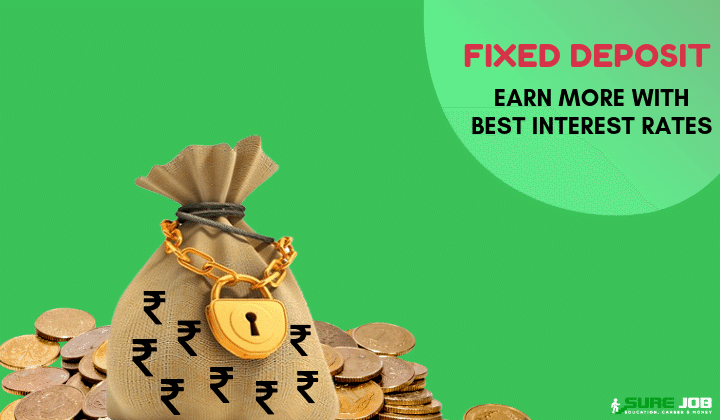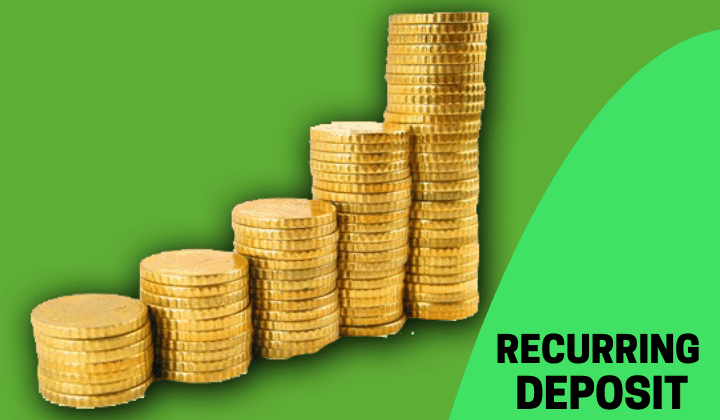Lots of Indians from all walks of life often wonder whether it really makes sense to put their money in Fixed Deposit schemes of financial organizations. That’s because there are several newer options that offer better returns that are now available in India.
Hence, my answer to ‘Whether FDs are worth it or not?' is both, Yes and No. Why? I’ll explain the reasons in detail through this article. Therefore, let’s start by understanding what is a Fixed Deposit?

What is a Fixed Deposit?
Fixed Deposit or FD is a bond between you and a financial organization. You hand over some money to the financial institution for periods that can vary between one week and as high as 10 years.
The financial institution gives you a certificate that mentions the amount, date from which your FD starts and maturity period. It clearly mentions the amount of interest you’ll get for your investment.
The term ‘Fixed’ comes from the fact that you’re handing over a specific amount of money to the bank or financial organization.
Means, you cannot add or withdraw money once you and the financial organization or bank, enters the bond. You’ll have to pay a penalty for violating this bond and withdrawing money prematurely.
There are ways to get the money you’ve invested in an FD which I’ll discuss later.
Investing in Fixed Deposit
Under existing rules and regulations of the Ministry of Finance and Reserve Bank of India, there are several financial institutions where you can invest in a Fixed Deposit.
- India Post Savings Bank/ India Post Payments Bank
- Public Sector/ Nationalized Banks.
- Cooperative Banks.
- Private Banks.
- Foreign Banks.
- Regional Banks.
- Rural Banks.
- Payments Banks.
- Small Finance Banks.
- Digital or Online Banks.
- Cooperative Credit Societies/ Employee Credit Societies.
- Large Non-Banking Financial Companies (NBFCs).
As we can see, there are 12 different options where you can invest money in a Fixed Deposit. RBI encourages financial institutions and people to invest in FDs. Because financial institutions give loans with your money or invest it in excellent plans and schemes to earn profits.
The money you invest in FD actually helps the growth of the Indian economy. Hence, you get excellent interest rates on a Fixed Deposit.
Best FD Interest Rates
Obviously, you’d want the best interest rates on your Fixed Deposit. Finding which financial institution is providing the best rates can be a bit tricky. Therefore, I’m providing some guidelines on how you can get the best rates on Fixed Deposits.
- These interest rates are indicative and for a five-year FD term only.
- Non-Resident Indians (NRIs) get between 0.2 and 0.5 percent more interest on their Fixed Deposit investments.
- Senior Citizens, persons with special needs and women can get higher interest rates from most banks and NBFCs.
Interest rates will vary from five percent per annum to nine percent per annum on a simple or compounded basis, depending upon the period of time and type of financial institution.
India Post Savings Bank/ India Post Payments Bank
India Post Savings Bank and India Post Payments Bank offer the following rates on FD.
- General (including minors to persons aged 59 years): 7.0 percent per annum.
- Senior Citizens Savings Scheme (60 years and older people): 8.70 percent per annum.
- National Savings Monthly Income Account: 7.3 percent per annum.
Additionally, India Post Savings Bank also offers two more services that operate on lines of Fixed Deposit.
- Kisan Vikas Patra: 7 percent per annum.
- National Savings Certificate: 8 percent per annum.
These five FD schemes from India Post Savings Bank and India Post Payments Bank are the most popular in India. For the simple reason: They are available from over 155,000 post offices across the country.
Small Finance Banks
The new generation of financial institutions in India, known as Small Financial Banks offers the best rates on FD currently.
- General: 6.5 percent per annum.
- Senior citizens: 7 percent per annum.
For deposits of 10 years, senior citizens can get up to 9.5 percent interest while others get 8.3 percent interest on their FDs at Small Finance Banks.
Nationalized, Cooperative, Private & Foreign Banks
All banks offer excellent interest rates on an FD. They range between 8.25 percent per annum to 4 percent per annum.
Now, remember, these rates are subject to change anytime and depend upon something known as Repurchase Rate (Repo Rate) that Reserve Bank of India announces regularly. I’ll explain how the RBI Repo Rate affects the interest you can earn on an FD.
Payments Banks & Digital Accounts
Currently, only Paytm Payments Bank is offering the facility to open a Fixed Deposit account. This is a paperless FD account that pays as high as 7.6 percent interest per annum. This FD has a maturity of 13 months. You can renew the FD after maturity or transfer your cash and interest.
Some digital banks such as Kotak 811 from Kotak Mahindra Bank also offer slightly higher interest for FDs created online, through their smartphone app or website.
Cooperative Credit Societies/ Employee Credit Societies
You can get a whopping 9.5 percent interest by investing in a Fixed Deposit with some of the best cooperative credit societies that flourish across India. However, you’ll have to take extra care before putting money on an FD with such cooperative credit societies.
Quite a few of them fail and you can lose your investment. Hence, look for cooperative credit societies that have an excellent reputation and strong financial background.
Another way to get the best rates on FD is from Employee Credit Societies or Employee Credit Unions, as they are sometimes known.
Usually, Employee Credit Societies accept FDs and deposits only from persons employed with that particular organization.
Usually, most organizations of Central and state governments have such Employee Credit Societies. A few private organizations also have Employee Credit Societies. Check with your employer if such a society operates within the organization.
Non-Banking Financial Companies
Non-Banking Financial Companies or NBFCs are hot favorites among high net worth individuals. That’s because some of them accept only Rs.100,000 and above for an FD.
Other NBFCs are not so particular and require a minimum investment of Rs.10,000 to Rs.25,000 for an FD. And in exchange, they provide fairly high returns on your FD.
Look for some of the largest NBFCs that offer FD schemes. These will usually be NBFCs run by a large business group or financial institution. Some NBFCs will give as high as 8.60 percent returns per annum on your FD, which is fairly high when you compare over various banks.
They also give more interest to Senior Citizen and NRI accounts.
Here’s a word of caution: There are several small, mushrooming NBFCs that are cropping up across India. They might offer higher interest rates but your money could be at risk. Therefore, I suggest you opt only for those NBFCs that are part of large companies.
Opening a Fixed Deposit Account
This is a very simple process. Nowadays, you can invest in FDs either online, through mobile apps of banks or by visiting a branch or office. You’ll need some documents to open an FD.
- Permanent Account Number (PAN) or declaration on Form-60 of Income Tax Department if you don’t have a PAN.
- Proof of address such as ration card, utility bill on your or homeowner’s name, driving license, Voter ID card, Aadhar card, driving license, valid passport, Pension & Retirement Account Number (PRAN) card or any government-issued document.
- It’s important to note that Aadhar card is not compulsory to open a Fixed Deposit account provided you have other proof of address in India.
- Savings or current bank account in your name or a joint account.
- Non-Resident Indians require a valid passport with a residence permit, US Green Card or it's equivalent, work permit of any other proof that shows they reside outside India.
- Senior citizens will require a Senior Citizen Card issued by Central or state government or proof of date of birth. This proof can be PAN card, Aadhar card, PRAN card, birth certificate, Affidavit of Birth, educational certificates bearing the date of birth or valid passport.
RBI Repo Rate & FD Rates
As I mention earlier, Fixed Deposit rates depend upon something known as Repurchase Rate or Repo Rate.
Repo Rate is the rate at which RBI lends money to clients, generally banks and NBFCs, when they are short of cash. Whenever RBI drops Repo Rates, it allows banks and NBFCs to get cheaper funds.
Hence, their reliance on money from Fixed Deposits by investors reduces. Consequently, banks also drop interest rates they offer for FDs, which affects your investment.
In recent days, RBI has been lowering its Repo Rate. Consequently, most banks and NBFCs are reducing interest rates on FDs too. This is one of the biggest flipsides of investing large money in FDs.
However, if you’ve taken an FD when the bank was offering a higher interest, there’s nothing to worry. The bank or NBFC usually doesn’t backtrack on its bond. The new, lower rate will be applicable only when someone goes to invest in a FB after Repo Rates are slashed.
FD Rate Calculator
So, how does one find out how much interest you can earn by investing in a Fixed Deposit? How to find the best deals in town without having to browse websites of several banks and NBFCs and visiting branches and offices?
The answer is very simple really. Use an FD interest rate calculator of a topmost bank in India. This will give you a good idea of how much money you stand to gain by investing in an FD.
Understandably, different banks and NBFCs will have various rates. But an FD rate calculator can provide approximate figures.
Hacks to Invest on FDs
Here are some hacks that can help you get the most from your investment on FD.
- Keep tabs on RBI Repo Rates. Always invest when banks increase the interest they’ll pay on a Fixed Deposit. If you invest blindly, chances are you’ll end up with low interest.
- Look for ‘Deposit Mobilization’ drives by banks and NBFCs. They offer better interest rates on FDs during such promotions and campaigns.
- There are several special FD schemes with higher interest for women investors. You can avail these by opening an FD in the name of a trustworthy female relative.
- Opening an FD on your parents’ name can get higher interest if they are senior citizens.
- Making a nomination while opening an FD account will help your successors avoid countless legal hassles in claiming the money, after your demise.
- Shop around for FDs- meaning find who’s offering the highest rates, rather than settling for one from your main bank.
- Bank managers and staff aggressively promote FDs to their clients. With some tact, you can leverage an FD investment to get better services or benefits from the bank.
- Remember, FDs are best as short to mid-term investment options only. Never opt for long-term FDs since money value deprecates.
Advantages of Fixed Deposit
Now coming back to my mixed answer whether an FD is worth it or not. Let’s study some salient features of a Fixed Deposit.
- A Fixed Deposit with banks is very safe and almost risk-free. Deposit Insurance & Credit Guarantee Corporation, a subsidiary of RBI guarantees FDs up to a maximum of Rs.100,000. That means you’ll get up to Rs.100,000 or lower, depending upon the value of your FD, if a member bank or NBFC crashes and fails for any reason.
- You can avail loans or credit cards by pledging an FD with some banks and NBFCs. A secured credit card. Usually, you’ll get up to 80 percent of the value of FD as credit. A FD secured credit card is the best way to build your credit score or repaid it, provided you pay outstanding bills on time. And if you default on repayments for any reason, the bank cannot take you to court: they will simply take money from your FD.
- Returns on your FD are guaranteed. Meaning, you’re entitled to the money that a bank or NBFC promises you at the end of the FD term. Your returns don’t depend upon situations in the stocks and money market.
- Only you can pledge or redeem your FD: hence it’s safe even if your FD certificate is lost or stolen. At best, the bank or NBFC will charge you some money to issue a new certificate in place of the lost or stolen one.
- FDs can be taken in the name of minors, jointly with spouse, parents, siblings or even friends. You can select who can operate the FD account.
- Nomination facility on FDs ensures the money and interest goes to your designated heir. A nomination on FD cannot be disputed in courts.
- Nowadays, you can also hold FD in Dematerialized form or without a paper certificate. Instead, it will appear only on your computer screen or mobile. This makes it secure against theft and abuse.
- You can invest in FDs online or by visiting a bank. There’s no need for pesky brokers who’ll sell you an inferior product to get higher commissions.
Disadvantages of Fixed Deposit
Having said that FDs holds several advantages, it’s also fair to list the various disadvantages too.
- The interest you earn from Fixed Deposit is taxable after maturity. You’ll have to declare earnings from an FD while filing your annual Income Tax. If you’re outside the taxable income bracket, you can seek Income Tax Returns.
- You can opt for Tax Deduction at Source (TDS) when applying for an FD, which means the bank or NBFC will deduct Income Tax before paying you the maturity amount. Or you can report it as ‘Income from Other Sources’ while filing Income Tax.
- In recent years, FDs are taking a heavy beating since more attractive options such as Mutual Funds are available. Equity-based Mutual Funds can earn as high as 18 percent over a period of five years compared over a maximum of 9 percent on FD. Liquid, debt and hybrid Mutual Funds can also provide equal or higher returns. However, Mutual Fund returns depend upon stocks and money market conditions and volatility.
- The money you invest in FD tends to lose value despite earning interest due to inflation and deprecation of the Indian Rupee. Means, your money on FD will have lower purchasing power- something that can be avoided with Mutual Funds.
- Generally, you cannot redeem an FD before the maturity period without losing a considerable amount of money. However, you can redeem Mutual Funds and other financial instruments with little or no loss.
- An FD is useless if you need money in an emergency due to lock-in periods before you can seek payment. In stark contrast, Liquid Mutual Funds provide cash within 24 to 48 hours after placing a redemption request.
- Nominations on FD aren’t a secret, unlike in Mutual Funds and other investments. This can lead to domestic squabbles and worse, lead to violence against senior citizens by close relatives.
- You have to disclose your FD holdings even if they aren’t mature while filing Income Tax Returns.
- Equity Linked Saving Schemes (ELSS) are a category of Mutual Funds that actually allow you to save Income Tax under Section 80-C of Income Tax Act while giving you about 15 percent returns over a period of three years.
Wrap Up
Despite inherent advantages and disadvantages of investing in Fixed Deposits, it’s a financial instrument worth including in your savings and investment portfolio.
An FD provides some degree of security against money market volatility and can prove a good asset for the future if you invest and reinvest wisely.
At the same time, putting all your savings on FDs can prove suicidal for your financial wellness since the interest you gain will definitely not match inflation rates. Therefore, invest wisely on Fixed Deposits.








